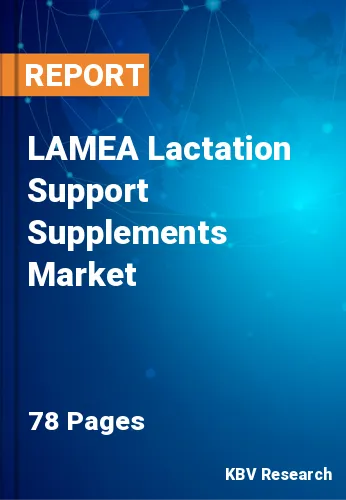The Latin America, Middle East and Africa Lactation Support Supplements Market would witness market growth of 9.6% CAGR during the forecast period (2023-2029).
The availability of convenient payment options, free home delivery, and flexible return policies are anticipated to contribute to the growth of the market significantly. In addition, multiple e-commerce enterprises are vying for market share in the area by introducing their food brands to expand their operations. The forecast period anticipates a surge in demand for lactation support supplements due to the rapid growth of e-commerce sales.
A diverse range of ingredients are utilized to produce lactation support supplements, each offering distinct advantages. Foeniculum vulgare, commonly known as fennel, is a herb with a distinct licorice flavor that originates from the Mediterranean region. It is primarily recognized for its medicinal properties in treating colic. There have been anecdotal reports indicating a rise in milk production. Fennel boasts a variety of essential nutrients, including vitamin C, phosphorus, potassium, copper, manganese, and folate. In moderation, this food item can be a nutritious source of fiber to support the health of a breastfeeding mother.
Palm Dates have a long history as a galactagogue. Dates are sweet fruit that is low in fat and protein. Product made from it boasts a rich composition of essential minerals, including but not limited to selenium, zinc, copper, potassium, and magnesium. In addition, the product features a blend of B-complex vitamins, vitamin C, and a significant amount of dietary fiber. In addition, palm dates possess antioxidant properties which can be beneficial for business purposes.
The mother's sense of having insufficient breast milk has been the most generally stated reason for early discontinuation of nursing, indicating a lack of professional support. Other variables include an absence of assistance for women who return to work or education while still breastfeeding, as well as the mother's age, as younger mothers introduced prepared food earlier than older mothers, most of them starting from the third month. The lack of knowledge, proper medical supervision, and the prevalence of lactation insufficiency are projected to provide growth opportunities for the utilization of lactation support supplements and boost the market growth in LAMEA.
The Brazil market dominated the LAMEA Lactation Support Supplements Market by Country in 2022, and would continue to be a dominant market till 2029; thereby, achieving a market value of $18.2 million by 2029. The Argentina market is exhibiting a CAGR of 10.2% during (2023 - 2029). Additionally, The UAE market would showcase a CAGR of 9.3% during (2023 - 2029).
Based on Ingredient Type, the market is segmented into Fenugreek, Fennel, Oatmeal, Moringa, Milk thistle and Others. Based on Formulation, the market is segmented into Capsules/Tablets, Powder, Liquid and Others. Based on Sales Channel, the market is segmented into Direct Sales Channel, Online Sales Channel, Pharmacies/Drug Stores and Others. Based on countries, the market is segmented into Brazil, Argentina, UAE, Saudi Arabia, South Africa, Nigeria, and Rest of LAMEA.
Free Valuable Insights: The Worldwide Lactation Support Supplements Market is Projected to reach USD 930.9 Million by 2029, at a CAGR of 6.9%
The market research report covers the analysis of key stake holders of the market. Key companies profiled in the report include Nestle S.A, New Chapter, Inc. (Procter & Gamble Inc.), Pink Stork, Mama's Select, ACTIF USA, Anya Labs, Inc., Mother Love Herbal Company, Mommy Knows Best, Rumina Naturals, Inc., and Mommy's Bliss, Inc.
By Ingredient Type
By Formulation
By Sales Channel
By Country
Our team of dedicated experts can provide you with attractive expansion opportunities for your business.

